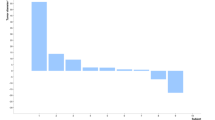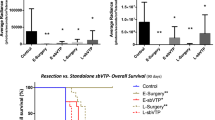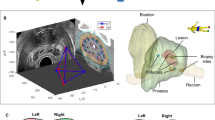Abstract
A phase I-II study to evaluate gene-mediated cytotoxic immunotherapy in newly diagnosed prostate cancer before radical prostatectomy was conducted in Monterrey, Mexico. First, to investigate delivery of adenovirus to the prostate, fluorescently labeled vector was injected into fresh prostatectomy specimens and distribution was visually analyzed. The optimal volume and site instillation was then used for transrectal ultrasound guided intraprostatic injection in 10 patients with adenocarcinoma scheduled for radical prostatectomy. Each received two apical and two basal 0.5 ml injections of AdV-tk for a total of 1 × 1011 vp followed by 14 days of prodrug. Nine patients continued to tumor resection: six high risk, one intermediate and two low risk. In vivo vector distribution was analyzed from the resected tissue of four patients. Patients were monitored for tumor progression and acute and long-term safety. For vector delivery, two apical and two basal injections of 0.5 ml led to optimal organ-wide distribution ex vivo and in vivo. Cytotoxicity was evidenced by transient rise in PSA and tumor histology. There were no significant adverse events deemed related to the treatment and no late toxicities after median follow-up of 11.3 years. All six high-risk patients had positive surgical margins and one had seminal vesicle involvement. Despite slow PSA rise post surgery in three of these patients, none developed metastases. The intermediate- and low-risk patients had complete resections and none have progressed. In conclusion, in vivo transrectal ultrasound guided instillation of an adenoviral vector into four sites in the prostate was practical as an outpatient procedure, well tolerated and led to distribution throughout the intraprostatic tumor mass. AdV-tk demonstrated no significant acute or late toxicities. Trends in PSA and disease progression conveyed the possibility of a sustained immune response against residual disease.
This is a preview of subscription content, access via your institution
Access options
Subscribe to this journal
Receive 12 print issues and online access
$259.00 per year
only $21.58 per issue
Buy this article
- Purchase on Springer Link
- Instant access to full article PDF
Prices may be subject to local taxes which are calculated during checkout




Similar content being viewed by others
References
Jemal A, Siegel R, Xu J, Ward E . Cancer statistics. CA Cancer J Clin 2010; 60: 277–300.
Ferlay J Cancer Incidence and Mortality Worldwide. GLOBOCAN 2008 v2.0 (2010).at <http://globocan.iarc.fr>.
Gomez-Guerra LS, Martinez-Fierro ML, Alcantara-Aragon V, Ortiz-Lopez R, Martinez-Villarreal RT, Morales-Rodriguez IB et al. Population based prostate cancer screening in north Mexico reveals a high prevalence of aggressive tumors in detected cases. BMC Cancer 2009; 9: 91.
Walsh PC, DeWeese TL, Eisenberger MA . Clinical practice. Localized prostate cancer. N Engl J Med 2007; 357: 2696–2705.
Pound CR, Partin AW, Eisenberger MA, Chan DW, Pearson JD, Walsh PC et al. Natural history of progression after PSA elevation following radical prostatectomy. JAMA 1999; 281: 1591–1597.
Simmons MN, Stephenson AJ, Klein EA . Natural history of biochemical recurrence after radical prostatectomy: risk assessment for secondary therapy. Eur Urol 2007; 51: 1175–1184.
Zelefsky MJ, Pei X, Chou JF, Schechter M, Kollmeier M, Cox B et al. Dose escalation for prostate cancer radiotherapy: predictors of long-term biochemical tumor control and distant metastases-free survival outcomes. Eur Urol 2011; 60: 1133–1139.
Bolla M, Verry C, Long J-A . High-risk prostate cancer: combination of high-dose, high-precision radiotherapy and androgen deprivation therapy. Curr Opin Urol 2013; 23: 349–354.
Aguilar LK, Guzik BW, Aguilar-Cordova E . Cytotoxic immunotherapy strategies for cancer: mechanisms and clinical development. J Cell Biochem 2011; 112: 1969–1977.
Hall SJ, Mutchnik SE, Chen SH, Woo SL, Thompson TC . Adenovirus-mediated herpes simplex virus thymidine kinase gene and ganciclovir therapy leads to systemic activity against spontaneous and induced metastasis in an orthotopic mouse model of prostate cancer. Int J Cancer 1997; 70: 183–187.
Perez-Cruet MJ, Trask TW, Chen SH, Goodman JC, Woo SL, Grossman RG et al. Adenovirus-mediated gene therapy of experimental gliomas. J Neurosci Res 1994; 39: 506–511.
Vile RG, Nelson JA, Castleden S, Chong H, Hart IR . Systemic gene therapy of murine melanoma using tissue specific expression of the HSVtk gene involves an immune component. Cancer Res 1994; 54: 6228–6234.
Gagandeep S, Brew R, Green B, Christmas SE, Klatzmann D, Poston GJ et al. Prodrug-activated gene therapy: involvement of an immunological component in the ‘bystander effect’. Cancer Gene Ther 1996; 3: 83–88.
Kuriyama S, Kikukawa M, Masui K, Okuda H, Nakatani T, Akahane T et al. Cancer gene therapy with HSV-tk/GCV system depends on T-cell-mediated immune responses and causes apoptotic death of tumor cells in vivo. Int J Cancer 1999; 83: 374–380.
Agard C, Ligeza C, Dupas B, Izembart A, El Kouri C, Moullier P et al. Immune-dependent distant bystander effect after adenovirus-mediated suicide gene transfer in a rat model of liver colorectal metastasis. Cancer Gene Ther 2001; 8: 128–136.
Chen SH, Shine HD, Goodman JC, Grossman RG, Woo SL . Gene therapy for brain tumors: regression of experimental gliomas by adenovirus-mediated gene transfer in vivo. Proc Natl Acad Sci USA 1994; 91: 3054–3057.
Herman JR, Adler HL, Aguilar-Cordova E, Rojas-Martinez A, Woo S, Timme TL et al. In situ gene therapy for adenocarcinoma of the prostate: a phase I clinical trial. Hum Gene Ther 1999; 10: 1239–1249.
Mohler JL, Armstrong AJ, Bahnson RR, Boston B, Busby JE, D'Amico AV et al. Prostate cancer, Version 3.2012: featured updates to the NCCN guidelines. J Natl Compr Canc Netw 2012; 10: 1081–1087.
Zlobec I, Karamitopoulou E, Terracciano L, Piscuoglio S, Iezzi G, Muraro MG et al. TIA-1 cytotoxic granule-associated RNA binding protein improves the prognostic performance of CD8 in mismatch repair-proficient colorectal cancer. PLoS ONE 2010; 5: e14282.
Van der Linden RRM, Haagmans BL, Mongiat-Artus P, van Doornum GJ, Kraaij R, Kadmon D et al. Virus specific immune responses after human neoadjuvant adenovirus-mediated suicide gene therapy for prostate cancer. Eur Urol 2005; 48: 153–161.
Bolla M, van Poppel H, Tombal B, Vekemans K, Da Pozzo L, de Reijke TM et al. Postoperative radiotherapy after radical prostatectomy for high-risk prostate cancer: long-term results of a randomised controlled trial (EORTC trial 22911). Lancet 2012; 380: 2018–2027.
Thompson IM, Tangen CM, Paradelo J, Lucia MS, Miller G, Troyer D et al. Adjuvant radiotherapy for pathologically advanced prostate cancer: a randomized clinical trial. JAMA 2006; 296: 2329–2335.
Freedland SJ, Humphreys EB, Mangold LA, Eisenberger M, Dorey FJ, Walsh PC et al. Death in patients with recurrent prostate cancer after radical prostatectomy: prostate-specific antigen doubling time subgroups and their associated contributions to all-cause mortality. J Clin Oncol 2007; 25: 1765–1771.
Chhikara M, Huang H, Vlachaki MT, Zhu X, Teh B, Chiu KJ et al. Enhanced therapeutic effect of HSV-tk+GCV gene therapy and ionizing radiation for prostate cancer. Mol Ther 2001; 3: 536–542.
Sukin SW, Chhikara M, Zhu X, Ayala G, Aguilar LK, O'Brian Smith E et al. In vivo surgical resection plus adjuvant gene therapy in the treatment of mammary and prostate cancer. Mol Ther 2001; 3: 500–506.
Nestler U, Wakimoto H, Siller-Lopez F, Aguilar LK, Chakravarti A, Muzikansky A et al. The combination of adenoviral HSV TK gene therapy and radiation is effective in athymic mouse glioblastoma xenografts without increasing toxic side effects. J Neurooncol 2004; 67: 177–188.
Rainov NG, Fels C, Droege JW, Schäfer C, Kramm CM, Chou TC et al. Temozolomide enhances herpes simplex virus thymidine kinase/ganciclovir therapy of malignant glioma. Cancer Gene Ther 2001; 8: 662–668.
Hall SJ, Sanford MA, Atkinson G, Chen SH . Induction of potent antitumor natural killer cell activity by herpes simplex virus-thymidine kinase and ganciclovir therapy in an orthotopic mouse model of prostate cancer. Cancer Res 1998; 58: 3221–3225.
Predina JD, Kapoor V, Judy BF, Cheng G, Fridlender ZG, Albelda SM et al. Cytoreduction surgery reduces systemic myeloid suppressor cell populations and restores intratumoral immunotherapy effectiveness. J Hematol Oncol 2012; 5: 34.
Ayala G, Satoh T, Li R, Shalev M, Gdor Y, Aguilar-Cordova E et al. Biological response determinants in HSV-tk+ganciclovir gene therapy for prostate cancer. Mol Ther 2006; 13: 716–728.
Chiocca EA, Aguilar LK, Bell SD, Kaur B, Hardcastle J, Cavaliere R et al. Phase IB study of gene-mediated cytotoxic immunotherapy adjuvant to up-front surgery and intensive timing radiation for malignant glioma. J Clin Oncol 2011; 29: 3611–3619.
Acknowledgements
We thank the patients who volunteer to give of their time and effort for these clinical trials in the hope of improving medical care for future generations. We also thank Dr Jesús Zacarías Villarreal Pérez, Minister of Health for the State of Nuevo Leon, who placed his support and effort to acquire the stringent regulatory approvals to import the vector and conduct the first gene therapy trial in the country. Supported in part by Grant No. R44CA124032 from the National Cancer Institute.
Author information
Authors and Affiliations
Corresponding author
Ethics declarations
Competing interests
The authors identified as members of Advantagene, Inc. are employed by the company, which holds an interest in the AdV-tk technology. The remaining authors declare no conflict of interest.
Rights and permissions
About this article
Cite this article
Rojas-Martínez, A., Manzanera, A., Sukin, S. et al. Intraprostatic distribution and long-term follow-up after AdV-tk immunotherapy as neoadjuvant to surgery in patients with prostate cancer. Cancer Gene Ther 20, 642–649 (2013). https://doi.org/10.1038/cgt.2013.56
Received:
Accepted:
Published:
Issue Date:
DOI: https://doi.org/10.1038/cgt.2013.56
Keywords
This article is cited by
-
Gene therapy research in Asia
Gene Therapy (2017)
-
Adenovirus vector carrying REIC/DKK-3 gene: neoadjuvant intraprostatic injection for high-risk localized prostate cancer undergoing radical prostatectomy
Cancer Gene Therapy (2016)
-
Gene-mediated cytotoxic immunotherapy as adjuvant to surgery or chemoradiation for pancreatic adenocarcinoma
Cancer Immunology, Immunotherapy (2015)
-
Integrating Immunotherapies in Prostate Cancer
Current Oncology Reports (2015)



